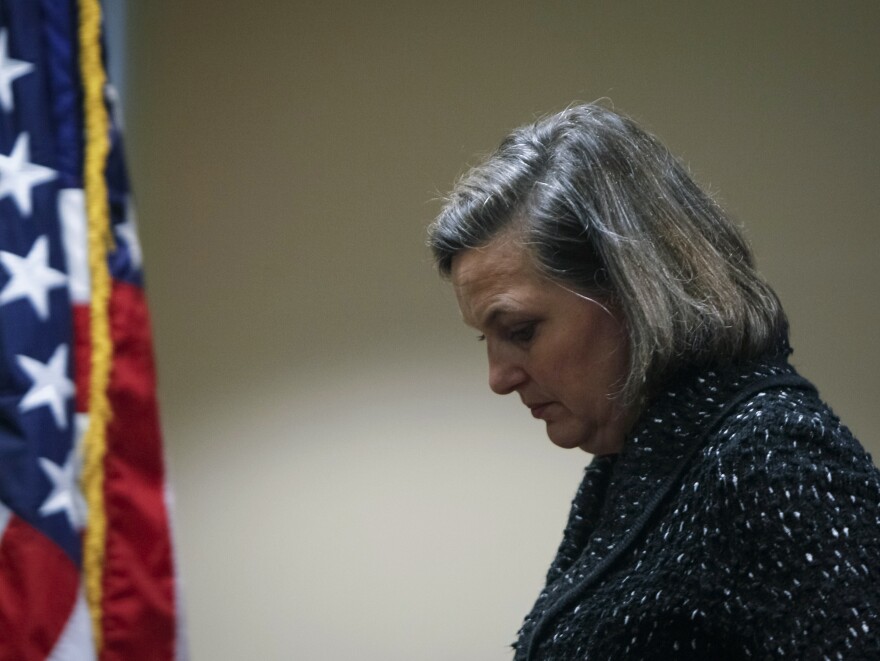An American diplomat got in trouble for saying something, well, undiplomatic.
Victoria Nuland, a top State Department official, thought she was having a private phone conversation. She was speaking about developments in Ukraine with the U.S. ambassador to that country, Geoffrey Pyatt. And she was speaking bluntly, even using a not-so-choice word about America's European allies.
It turned out their conversation was being recorded. The White House and the State Department suspect Russia is behind the episode.
Nuland is traveling in Kiev, and at a press conference earlier today, she refused to comment on what she called a "private diplomatic conversation." But she did admit it was "pretty impressive tradecraft."
U.S. State Department spokeswoman Jen Psaki called it a new low for the Russians. White House spokesman Jay Carney also blamed the Russians. He admitted there wasn't definitive proof, but noted that the audio was tweeted by a Russian government official.
Whoever is responsible, how might they have done it?
"Somehow this phone was tapped," says Richard Bejtlich, a chief security strategist at cybersecurity company FireEye and a fellow at the Brookings Institution. He also thinks Russia is behind this. Bejtlich can imagine several scenarios, though some are more probable than others.
A Secure Line?
The first important question to ask is whether the phone call was held on a secure line. It's often assumed that when government officials speak, they're on lines that can't easily be listened in on.
But that's not necessarily true. Unless Nuland and Pyatt were discussing classified information, they might not have seen any need to establish a secure line.
If, in fact, they were talking on a secure line, this breach would be far more serious, as it would suggest that an adversary had broken the encryption. That's not considered a likely scenario.
The Telephone System Itself
What's more likely is that Nuland and Pyatt were talking in the clear. And if the call was in the open, Bejtlich says, the decent quality of the audio is a clue to how it was intercepted.
"Given you've got a nice, clear conversation between both parties — you don't just hear one clearly and the other faintly — it's much more likely the telephone system itself was tapped," he says.
He also says the good audio suggests another possibility: There might have been malicious software on the phone itself. What's less likely is that a room was bugged. In that case, the audio quality of one end of the call would have been much better than the quality on the other end.
Bejtlich thinks the most probable explanation is that Russia was able to tap into Ukraine's phone carrier system.
"If the ambassador is located in Ukraine," he says, "that call has to get out through Ukraine, and at that point it's open for interception."
A Diplomatic Embarrassment
To be clear, Russia has denied involvement. But Russia certainly had a lot to gain from the fallout of the revelations. The most damaging: Nuland is heard on the tape talking about a diplomatic solution to Ukraine's political crisis involving mediation from a number of parties.
"So that would be great," she's heard saying, "to help glue this thing, and have the U.N. help glue it, and you know, f - - - the E.U."
Nuland spent time this week apologizing to the European Union for those remarks.
She and the ambassador also discussed which members of Ukraine's opposition might be best to have in the government, and which should not be included.
The most novel aspect of this whole episode may not be that Russia — or some other country — was able to intercept a phone call made in the open. Odds are calls like this one have been intercepted — and not just by Russia — for years.
What's new is what happened next: Rather than listen to the tapped call, learn from it and file it away, someone decided that the real payoff was to get the audio out on YouTube.
Eavesdropping plus social media equals diplomatic embarrassment.
Copyright 2024 NPR



